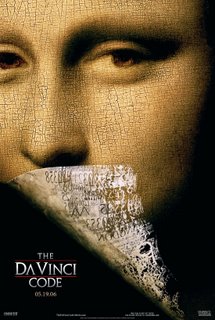 Here are some bits and pieces to read with your morning coffee:
Here are some bits and pieces to read with your morning coffee:Outreach magazine posted an article from their March/April issue, "The Da Vinci Code Intrigue," which takes another look at the phenomenon surrounding the film. Here’s a key tidbit:
. . . [I]n Canada, the National Geographic Channel commissioned a survey in 2005 in anticipation of a full day of programming inspired by The Da Vinci Code. It found that 32% of Canadians who have read the novel believe that the theories outlined in it are true.And just what kinds of theories are people believing? You can get an idea from this excerpt from a Dec. 8 Newsweek Q&A article (which is showing up again in Google News searches):
Is there a secret cache of documents that reveal the true history of Christianity?Arg. Are you thinking this is some revolutionary new discovery? It's not. The texts they're referring to are the ones found in 1945 which include The Gospel of Thomas, brought into mainstream popular culture by the Jesus Seminar well before Dan Brown wrote Da Vinci Code. It's old news that most scholars agree Thomas was probably written in the 2nd or maybe early 3rd century, well after the gospels we know in the New Testament, which were based on eye-witness accounts.
No one knows, but scholars are busy analyzing ancient documents found in Egypt in the last century. These texts, known as the Gnostic Gospels, were lost for centuries, and could shed new light on the origins of the church.
It's stuff like this that renews my passion for using the Da Vinci Code to get God-talk - accurate God-talk - out into the open spaces. Back to the Outreach article, which articulates various ways Christians can do that:
Both the book and the movie are sure to reinforce people's skepticism, says Josh McDowell, apologist and author of The Da Vinci Code: A Quest for Answers (Green Key Books). "If we do not deal with this subject in a positive way, we run the risk of losing a generation of marginal Christians and honest seekers to skepticism," he explains. "Usually as the body of Christ, we lag behind. But we have an opportunity now to get ahead of this issue and address it in a positive way."It’s also a chance to preach “theology 101” from the pulpit in an interesting way (and correct misconceptions like the one in Newsweek). One person in the article said it this way: "The Da Vinci Code puts apologetics back in the game. It allows us to teach theology in church. If we had done this before, people would have said, 'This is so boring. What does this have to do with my life today?' We can now bring some meat to the table that I don't think we've had the opportunity to do before."
Another in the article cautioned that churches and Christians go beyond only offering answers, but perhaps ask questions as well:
"I think the secret in dealing with provocative questions is not in providing 'right' answers, but in reframing the discussion as Jesus so often did when He was being set up," says Dave Ping, director of Equipping Ministries International (equippingministries.org). He encourages Christians to welcome the interest in Jesus with thought-provoking questions such as: What do you think about Jesus? How have you come to your conclusions? Why do you think speculation about how Jesus lived stirs so much passion?In other Da Vinci news, it appears the phenomenon has spurred some local Boston filmmakers to make a spoof of the anticipated blockbuster and spawned a series of corporate scavenger hunts.
Rather than wasting time debating an impersonal pop-culture theory, Ping hopes Christians will focus on the underlying central questions: Who is Jesus? What does He have to do with me? Where can I go to find the answers?
There you are. All you wanted to know – and more.